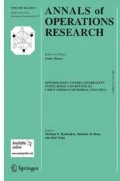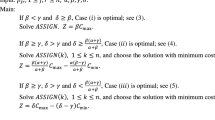Abstract
In this paper, we consider due-window assignment scheduling in the proportionate flow shop setting with position-dependent weights where the weights depend on the position in which a job is scheduled. Under the common due-window (CONW) and slack due-window (SLKW) assignment methods, the location of the window and its properties are established. The objective is to determine the sequence of all jobs to minimize the total weighted cost function where the total weighted cost function must also consider the window start time and size. Based on these considerations, the corresponding algorithm and algorithm complexity are proposed.
Similar content being viewed by others
References
Allahverdi, A., & Werner, F. (2018). Scheduling in manufacturing systems: New trends and perspectives. Journal International Journal of Production Research, 56(19), 6333–6335.
Aqil, S., & Allali, K. (2019). On a bi-criteria flow shop scheduling problem under constraints of blocking and sequence dependent setup time. Annals of Operations Research. https://doi.org/10.1007/s10479-019-03490-x.
Cheng, C.-Y., Chen, K.-C., Ying, H.-H., & Lin, J.-X. (2018). Optimization algorithms for proportionate flowshop scheduling problems with variable maintenance activities. Computers & Industrial Engineering, 117, 164–170.
Cheng, T. C. E., Wu, C.-C., Chen, J.-C., Wu, W.-H., & Cheng, S.-R. (2013). Two-machine flowshop scheduling with a truncated learning function to minimize the makespan. International Journal of Production Economics, 141, 79–86.
Cheng, T. C. E., Yang, S.-J., & Yang, D.-L. (2012). Common due-window assignment and scheduling of linear time-dependent deteriorating jobs and a deteriorating maintenance activity. International Journal of Production Economics, 135, 154–161.
Geng, X.-N., Wang, J.-B., & Bai, D. (2019). Common due date assignment scheduling for a no-wait flowshop with convex resource allocation and learning effect. Engineering Optimization, 51(8), 1301–1323.
Gerstl, E., & Mosheiov, G. (2013). Minmax due-date assignment with a time window for acceptable lead-times. Annals of Operations Research, 211, 167–177.
Hardy, G. H., Littlewood, J. E., & Polya, G. (1967). Inequalities (2nd ed.). Cambridge: Cambridge University Press.
Janiak, A., Janiak, W., Kovalyov, M. Y., Kozan, E., & Pesch, E. (2013). Parallel machine scheduling and common due window assignment with job independent earliness and tardiness costs. Information Sciences, 224, 109–117.
Janiak, A., Janiak, W. A., Krysiak, T., & Kwiatkowski, T. (2015). A survey on scheduling problems with due windows. European Journal of Operational Research, 242(2), 347–357.
Jiang, C., Zou, D.-X., Bai, D.-Y., & Wang, J.-B. (2020). Proportionate flowshop scheduling with position-dependent weights. Engineering Optimization, 52(1), 37–52.
Li, G., Li, N., Sambandam, N., Sethi, S. P., & Zhang, F. (2018). Flow shop scheduling with jobs arriving at different times. International Journal of Production Economics, 206, 250–260.
Limana, S. D., Panwalkar, S. S., & Thongmee, S. (1997). A single machine scheduling problem with common due window and controllable processing times. Annals of Operations Research, 70, 145–154.
Liu, X., Lu, S., Pei, J., & Pardalos, P. M. (2018). A hybrid VNS-HS algorithm for a supply chain scheduling problem with deteriorating jobs. International Journal of Production Research, 56(17), 5758–5775.
Mor, B., & Mosheiov, G. (2015). Minimizing the number of early jobs on a proportionate flowshop. Journal of the Operational Research Society, 66, 1426–1429.
Mor, B., & Mosheiov, G. (2017). Minsum and minmax scheduling on a proportionate flowshop with common flow-allowance. European Journal of Operational Research, 254(2), 360–370.
Mosheiov, G., & Sarig, A. (2008). A due-window assignment problem with position-dependent processing times. Journal of the Operational Research Society, 59(7), 997–1003.
Panwalkar, S. S., & Koulamas, C. (2015). On equivalence between the proportionate flow shop and single-machine scheduling problems. Naval Research Logistics, 62(7), 595–603.
Panwalkar, S. S., Smith, M. L., & Koulamas, C. (2013). Review of the ordered and proportionate flow shop scheduling research. Naval Research Logistics, 60(1), 46–55.
Pei, J., Pardalos, P. M., Liu, X., Fan, W., & Yang, S. (2015). Serial batching scheduling of deteriorating jobs in a two-stage supply chain to minimize the makespan. European Journal of Operations Research, 244(1), 13–25.
Sun, L.-H., Cui, K., Chen, J.-H., Wang, J., & He, X.-C. (2013). Research on permutation flowshop scheduling problems with general position-dependent learning effects. Annals of Operations Research, 211, 473–480.
Sun, X., & Geng, X.-N. (2019). Single-machine scheduling with deteriorating effects and machine maintenance. International Journal of Production Research, 57(10), 3186–3199.
Tellache, N. E. H., & Boudhar, M. (2018). Flow shop scheduling problem with conflict graphs. Annals of Operations Research, 261, 339–363.
Valledor, P., Gomez, A., Priore, P., & Puente, J. (2018). Solving multi-objective rescheduling problems in dynamic permutation flow shop environments with disruptions. International Journal of Production Research, 56(19), 3551–3560.
Wang, D., & Li, Z. (2019). Bicriterion scheduling with a negotiable common due window and resource-dependent processing times. Information Sciences, 478, 258–274.
Wang, D., Yin, Y., & Cheng, T. C. E. (2017). A bicriterion approach to common flow allowances due window assignment and scheduling with controllable processing times. Naval Research Logistics, 64(1), 41–63.
Wang, J.-B., & Wang, M.-Z. (2011). Worst-case behavior of simple sequencing rules in flow shop scheduling with general position-dependent learning effects. Annals of Operations Research, 191, 155–169.
Wang, J.-B., & Wang, M.-Z. (2013). Minimizing makespan in three-machine flow shops with deteriorating jobs. Computers & Operations Research, 40(2), 547–557.
Wang, J.-B., & Wang, M.-Z. (2014). Single-machine due-window assignment and scheduling with learning effect and resource-dependent processing times. Asia-Pacific Journal of Operational Research, 31(5), 55, Article ID 1450036.
Wang, J.-B., Zhang, B., Li, L., Bai, D.-Y., & Feng, Y.-B. (2020). Due-window assignment scheduling problems with position-dependent weights on a single machine. Engineering Optimization, 52(2), 185–193.
Yeung, W. K., Oguz, C., & Cheng, T. C. E. (2001). Minimizing weighted number of early and tardy jobs with a common due window involving location penalty. Annals of Operations Research, 108, 33–54.
Yin, Y., Cheng, T. C. E., Wu, C.-C., & Cheng, S.-R. (2014). Single-machine due window assignment and scheduling with a common flow allowance and controllable job processing time. Journal of the Operational Research Society, 65(1), 1–13.
Acknowledgements
This work was supported by the MOE Project of Humanities and Social Science of China (19YJE630002) and the National Natural Science Foundation of China (71971165; 71832011; 71401033).
Author information
Authors and Affiliations
Corresponding author
Additional information
Publisher's Note
Springer Nature remains neutral with regard to jurisdictional claims in published maps and institutional affiliations.
Rights and permissions
About this article
Cite this article
Sun, X., Geng, XN. & Liu, T. Due-window assignment scheduling in the proportionate flow shop setting. Ann Oper Res 292, 113–131 (2020). https://doi.org/10.1007/s10479-020-03653-1
Published:
Issue Date:
DOI: https://doi.org/10.1007/s10479-020-03653-1



